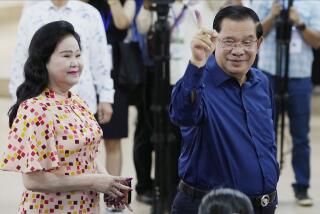Is a Neutral Cambodia Really in the Cards? : Yes, if Beijing will play its hand right and not walk away
- Share via
Two decades of bitter fighting have left Cambodia shattered. The five permanent members of the U.N. Security Council have painstakingly forged a plan to bring peace to Cambodia. But the wild card in the plan is the Khmer Rouge, the Chinese-backed faction whose murderous ways turned the Cambodian landscape into killing fields.
It will strike many people as ludicrous that the Khmer Rouge is even included in the peace process. But no plan is realistic that excludes the Khmer Rouge. The trick will be to contain it and disarm it. Doing that and keeping the Khmer Rouge at the bargaining table is primarily Beijing’s responsibility.
Armed and dangerous, the Khmer Rouge has been out of power since 1979, but it has continued to draw a following under a banner of nationalism that unites Cambodians in their common hatred of Vietnam. Supplied with Chinese weapons, including tanks, the Khmer Rouge has chalked up military gains while the Hanoi-backed Phnom Penh government of Cambodian Prime Minister Hun Sen has grown increasingly weak and isolated. The two non-communist opposition groups, despite support from Washington, have proved no match for the vicious Khmer Rouge.
NEUTRALIZATION: The U.N. approach seeks to neutralize the Khmer Rouge and shift the Cambodia conflict from a military contest to a political one. Last fall the four warring factions accepted in principle the U.N. peace plan, which calls for a cease-fire, an interim U.N. administration and free elections. The four factions are to meet in Jakarta later this month to resolve residual differences over that plan.
That they had better do--and quickly. Time is playing in favor of the Khmer Rouge, which is still under the control of the notorious Pol Pot. Under his rule (1975-’79), the Khmer Rouge terrorized the country and slaughtered more than 1 million Cambodians. This evil force is still believed to have enough military hardware to last from two to five years. There have been reports in the last year of Khmer Rouge massacres of civilians and dissident troops.
Beijing is the Khmer Rouge’s lifeline, supplying as much as $80 million annually in military and other aid to the guerrilla force. The Chinese threw their support to the Khmer Rouge long ago to fight Soviet-backed Vietnam, a traditional Chinese enemy. But under the U.N. plan, Beijing would be under an international obligation to stop resupplying.
COOPERATION: Hanoi and Phnom Penh complain that the language of the U.N. plan makes no mention of the Khmer Rouge’s genocidal practices. By including the Khmer Rouge in the election process without acknowledging such atrocities, or spelling out concrete measures to prevent a repeat of the wanton killing, the Khmer Rouge would, in effect, be exonerated of its cruel misdeeds. China, one of the five permanent members of the U.N. council, is likely to balk at any proposed changes in the U.N. pact. But pulling out of the deal would be contrary to its own geopolitical interests in having a neutral Cambodia to the south. Beijing must at least extract from the Khmer Rouge the concessions necessary to deter it from resorting to its bloody ways. A watchful and demanding patron is the best--perhaps the only--way to keep the Khmer Rouge in line.
Beijing must play ball. The world basically overlooked human rights abuses during and since the Tian An Men Square demonstrations in 1989, when the Chinese army turned its tanks on dissidents. It owes one to the cause of world peace. Washington, a major architect and advocate of the U.N. plan, has been losing patience with Beijing as it considers renewing China’s most-favored-nation trading status. That Beijing might be a party to another Khmer Rouge rampage is simply intolerable. It would set back Chinese foreign policy for years.
More to Read
Sign up for Essential California
The most important California stories and recommendations in your inbox every morning.
You may occasionally receive promotional content from the Los Angeles Times.













